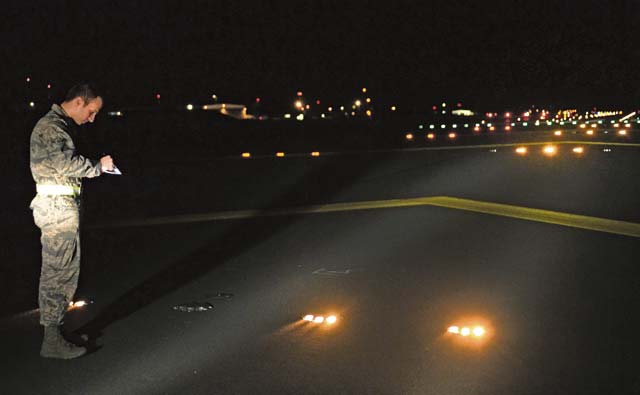
Airman Brandon Horning, 86th Operations Support Squadron airfield management operations coordinator, inspects and records the location of malfunctioning lights on the airfield, July 31 on Ramstein. The 86th OSS airfield management flight works around the clock to ensure the airfield is a safe and operational environment.
The 86th Operations Support Squadron airfield management flight works around the clock to ensure the airfield is a safe and operational environment.
During times of low visibility pilots utilize an airfield landing system. The ALS at Ramstein is the only Category two/three airfield throughout the Department of Defense. These categories allow pilots to land in conditions where they normally wouldn’t be allowed ton and is up to the airfield managers to maintain that system.
One of the ways they do that is by validating the ALS is working properly.
“All the different signs and lights, they all mean something important,” said Airman Brandon Horning, 86th OSS airfield management operations coordinator. “Inspecting the lights night and day is crucial to the safety of night operations for all aircraft, as well as for those driving on the runways.”
Ensuring lighting is in proper working condition is only one of their responsibilities as airfield managers.
“While we are out examining the lights we also look for any animals on the flight line,” said Horning. “Boar, deer, rabbits, foxes and birds; they’re a problem for us because that’s a potential danger for an aircraft using the runway.”
Not only do they respond to in-flight and ground emergencies for any circumstances that affect flight safety on the airfield, they also coordinate with various agencies, such as the air traffic control, fire department, aircraft maintenance and command post for airfield support.
“As airfield managers, we are the focal point for anything and everything happening on that airfield,” said Staff Sgt. Stephanie Heck, airfield management operations NCOIC. “Given the multitude of missions and sorties arriving and departing from Ramstein we need to keep the airfield capable and ready.”
Whether it’s inspecting the ALS or scouting for game, the 86th OSS AMOF ensures Ramstein maintains a safe airfield and its aircraft are ready for flight at a moment’s notice.


